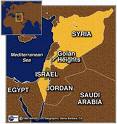Europe claims Israel preparing for war with Syria

TEL AVIV – European officials have been claiming to Syrian leaders the past few weeks Israel is preparing for a military confrontation with Damascus, in some cases providing Syria with inaccurate information, WND has learned.
A top source in Syrian President Bashar Assad’s Baath party told WND European leaders visiting Damascus in recent weeks delivered messages stating Israel was taking measures in advance of a large-scale conflict with Syria, including updating battle plans, training reservist soldiers and preparing the home front for missile attacks.
One senior European Union official told Assad the Israeli government instructed its major hospitals not to allow staff to take vacation time during the summer months for fear a conflict will break out during that period, according to the Baath party source.
Israeli security officials and spokesmen for several major Israeli hospitals denied the claim.
The European officials advised Assad to engage in dialogue with the Jewish state and the U.S. leading to a full Israeli withdrawal of the Golan Heights, the Baath official said. The Golan is strategic mountainous territory looking down on Israeli population centers twice used by Syria to mount ground invasions into Israel.
Israel this week engaged in a nationwide drill, acting out responses to various wartime scenarios, including salvoes of chemical-tipped missiles and major terrorist attacks. It was the largest war drill held in Israel since its establishment in 1948. Israeli government spokesmen said the drills were to test lessons learned during last summer’s war against the Hezbollah militia in Lebanon.
Israeli security sources confirmed stepped-up training schedules for Israel Defense Forces reservist troops have been implemented. They say the training is not related to any expected confrontations, but is in response to internal military investigations that found reservists were not properly trained for the Lebanon war.
According to a report today in the London-based Al-Hayat daily, talks between Israel and France concerning Syria concluded Israel is not interested in weakening Assad, because it does not know whether his replacement would present superior diplomatic alternatives. French officials told the newspaper Israel perceives Assad as weak but is not interested in confronting Syria out of fear that intervention would alter the political situation there.
Assad, who signed a military alliance with Iran, is accused of supporting the insurgency against U.S. troops in Iraq and funneling money and weapons to Hezbollah. Leaders of major Palestinian terror groups, including Hamas and Islamic Jihad, reside openly in Damascus.
WND this week quoted Palestinian and British diplomatic officials stating the European Union is pressing the U.S. to alter its policy toward Syria to be more in line with recommendations made last December by the Iraq Study Group, which petitioned Washington to engage in dialogue with Damascus.
A diplomat from Britain’s Foreign Ministry touring Israel this week said the UK received signals Washington is ready to act on some of the Study Group recommendations.
“America understands that Iraq cannot be solved unless Syria is engaged and Israel withdraws from the Golan Heights and the West Bank,” the diplomat said, speaking on condition his name be withheld.
The diplomat pointed to a visit to Syria last week by Ellen Sauerbrey, the U.S. assistant secretary of state for population, refugees and migration, as a public gesture that Washington is willing to engage Damascus. Sauerbrey was the most senior U.S. official to visit Syria since the U.S. withdrew its ambassador following the 2005 assassination of former Lebanese Prime Minister Rafik Hariri, for which Syria was widely blamed.
Syrian Deputy Foreign Minister Fayssal Mekdad told reporters following last week’s meeting Damascus is ready to engage in “serious” dialogue with Washington on all Middle East issues.
Also last week, EU Foreign Policy Chief Javier Solana told Syria he expected Israel to evacuate the entire Golan Heights as part of any future peace deal.
Solana’s remarks were blasted by Israeli Knesset members, who pointed out the EU chief did not call for Syria to stop supporting Hezbollah or providing refuge to the leadership of the Hamas and Islamic Jihad terror groups, who live openly in Damascus.

